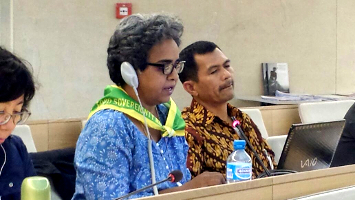Free, prior and informed consent is must to tackle agrarian conflicts: La Via Campesina in Geneva

A large delegation of peasant women and men, youth and indigenous people representing La Via Campesina are in Geneva this week along with allies from NGOs and Workers’ Unions, to take part in the fourth session of the working group meeting to negotiate on a UN Declaration for the rights of peasants and other people working in rural areas.
On May 15, while intervening during the discussions on Article 1 till 4 of the draft declaration, Geeta Devarajan representing La Via Campesina’s South Asian movements cited the issue of displacements in rural areas and emphasised on the need for free, prior and informed consent.
Here is a full text of her speech.
Madame Chair-Rapporteur, Delegates of the Council,
I am Geeta Devarajan from La Via Campesina, India.
I take this opportunity to urge the delegates of the Asian region in the United Nations to look into the situation on the displacement of the peasants and other people working in rural population. The issue of displacement and its consequences are also noted in the final study of the Human Rights Council which is the basis of this process towards a UN Declaration.
The displacement is caused by indiscriminate access to commercial organisations, like transnational corporations or big plantations to rural economy. The role of these organisations in rural economy endangers the livelihood of peasants and other people working in rural areas. The crucial importance of peasants, particularly ensuring food for all, not the few, in combating climate change and on conservation of biodiversity is further hampered by the displacement thereby endangers the Mother Earth.
The declaration promotes and protects the crucial role of peasants agriculture and ensures that peasants’ rights are human rights. I request the Asian governments to take the problem of displacement seriously. The Asian community has a very strong responsibility to end hunger and poverty.
Furthermore, we would like to highlight the importance of the article on the general obligations of state—which would enable peasants to realise their rights. More importantly the emphasis on the free, prior, and informed consent of peasants and other people working in rural areas stipulated in this article. This will be crucial to tackle the conflicts over natural and agrarian resources all over the globe.
We support these provisions and hope that the declaration is adopted by the Council at the earliest. The declaration will be a great achievement, not only for the sake of the peasants and other people working in rural areas, but also for the sake of a better world for generations to come.
I thank you.
